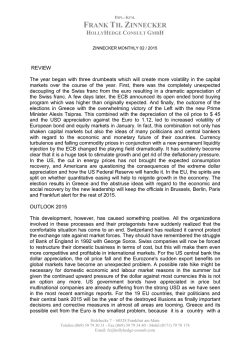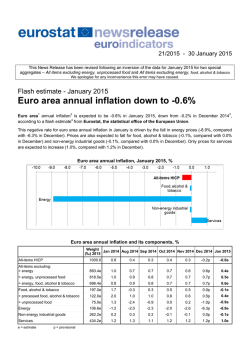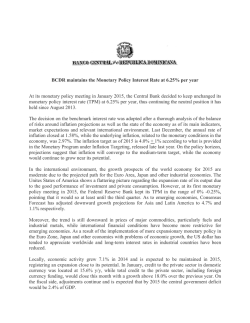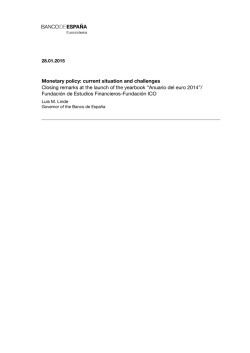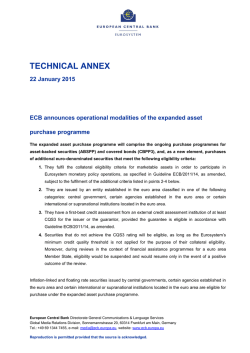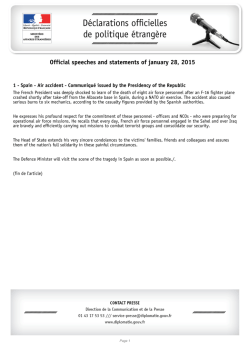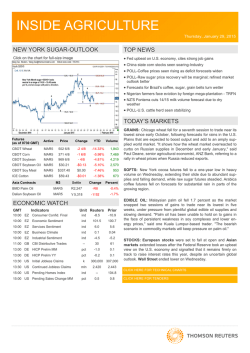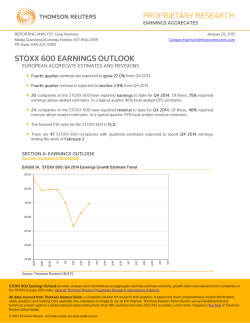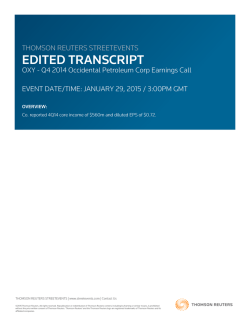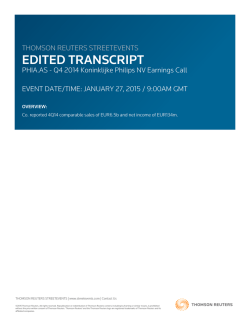
Press Summary - Wrightson ICAP
INSIDE DEBT PRODUCED BY REUTERS IN PARTNERSHIP WITH ICAP Friday, December 5, 2014 CHART OF THE DAY U.S. MARKETS TODAY U.S. nonfarm payrolls TODAY’S TOP STORY: U.S. employers added the largest number of workers in nearly three years in November and wage gains picked up, a sign of economic strength that could draw the Federal Reserve closer to raising interest rates. For more please click here Click on the chart for full-size image TREASURIES: Treasuries dropped after U.S. employers hired more workers in November than during any month in nearly three years, boosting expectations for the Federal Reserve to raise interest rates by mid2015. Benchmark 10-year notes were down 14/32, yielding 2.31 pct and 5year notes fell 14/32, to yield 1.69 pct. 30-year bonds were down 6/32, yielding 2.97 pct. The 5-30's treasury spreads tightened by 9 bps and the 2-30's treasury spreads tightened by 9 bps. U.S. payrolls grew by 321,000 in November, the biggest monthly gain since January 2012. TODAY’S TOP NEWS Bullish U.S. jobs report keeps Fed on track for mid2015 rate hike German industry orders surge but Bundesbank cuts growth forecasts China to deepen economic reforms in 2015 - Xinhua Household, govt spending keep euro zone economy growing in Q3 Germans resist ECB money-printing move, but Draghi gets key UK public reduce expectations of rate rise - BoE survey Canada loses 10,700 jobs in Nov after two months of big gains Greek deputy PM expects initial deal with lenders by Dec 15 Europe barely passes global bank rules test S&P cuts Italy sovereign rating to BBB-, Just above junk ECON WATCH FOR MONDAY DECEMBER 8 ET Indicators 04:30 EZ Sentix Index 08:15 CA House Starts, Annual. 10:00 US Employment Trends Unit Reuters Prior ind k ind -10.5 195.0 - -11.9 183.6 123.1 FOREX: The dollar reached fresh multiyear highs after a stronger-thanforecast November U.S. jobs report increased expectations the Federal Reserve may begin raising interest rates sooner than previously thought. The dollar index rose 0.72 pct to 89.344. The dollar rose 1.36 pct to 121.41 yen. The euro was down 0.72 pct at $1.2288. The British pound fell 0.63 pct to $1.5573. CORPORATES: Corporate bond spreads widened after the robust U.S. jobs report raised expectations that a rate hike from the Federal Reserve may materialize sooner than previously thought. The CDX-IG.23 index widened by 1 bps to 63 bps. STOCKS: The Dow and S&P 500 ended at record highs and closed out a seventh straight weekly advance as a strong jobs report indicated healthy economic growth, but perhaps to the point where interest rates could rise sooner than previously anticipated. American Eagle Outfitters fell 13.76 pct after the teen apparel retailer forecast a current-quarter profit below analysts' estimates. Delia's, another teen apparel retailer, said it was liquidating assets and would file for Chapter 11 bankruptcy protection "in the very near term." Its shares tumbled 83.83 pct. Abercrombie & Fitch fell 2.19 pct. The Dow rose 58.63 points, or 0.33 pct, to 17,958.73, the S&P 500 gained 3.41 points, or 0.16 pct, to 2,075.33 and the Nasdaq added 11.32 points, or 0.24 pct, to 4,780.76. For the week, Dow was up 0.7 pct, S&P 500 rose 0.4 pct, Nasdaq was down 0.2 pct. C & E: U.S. crude closed at its lowest since July 2009 as Brent averaged below $70 a barrel in the week for the first time since 2010, as strong U.S. employment data did little to lift the oil market's bearish mood. U.S. oil fell 1.68 pct to $65.69 per barrel. Brent was down 1.29 pct at $68.74 per barrel. Gold lost 1.16 pct to $1191.33 an ounce. Reuters-Jefferies index fell 0.30 pct to 252.95. For EYE ON ASIA click here For MARKET SNAPSHOT click here For MARKET SNAPSHOT on Asia click here For NEXT UP click here For EYE ON LATAM click here For DEEP DIVE click here INSIDE DEBT December 5, 2014 MARKET SNAPSHOT as of 3:20 pm EST REPURCHASE AGREEMENTS G/C MORTGAGE REPOS O/N 0.190 O/N 0.220 2-Week 0.180 2-Week 0.210 1-Month 0.240 1-Month 0.270 3-Month 0.240 3-Month 0.270 AGENCY REPOS i-REPOSM INDEX O/N 0.200 10:00 AM 0.203 2-Week 0.200 3:00 PM 0.196 1-Month 0.250 3-Month TREASURIES <5> <500> BID ASK 1-Mo Bill 0.020 0.015 3-Mo Bill 0.015 0.010 6-Mo Bill 0.080 0.075 1-Year 0.140 0.135 2-Year 99.719 99.727 3-Year 99.430 99.469 5-Year 99.133 99.141 7-Year 98.813 98.828 10-Year 99.453 99.516 30-Year 100.641 100.703 YIELD CHANGE 0.02 -0.005 0.015 -0.002 0.081 0.004 0.142 0.017 0.643 -0.195 1.073 -0.344 1.682 -0.512 2.059 -0.594 2.312 -0.648 2.967 -0.578 IR SWAPS <19901> SPREAD 2-Year 19.25 23.25 3-Year 18.75 22.75 5-Year 11.00 15.00 7-Year 5.25 9.25 10-Year 9.25 13.25 30-Year -6.00 -2.00 RATE 0.83 0.86 1.25 1.28 1.79 1.81 2.11 2.12 2.40 2.41 2.91 2.90 EQUITIES U.S. Interest rate swap—yield curve O/N 1-Month 3-Month 6-Month 12-Month BID - ASK 0.100 0.150 0.200 0.310 0.170 0.240 0.360 0.430 0.112 0.113 0.264 0.122 0.123 - 0.274 MATURITY 9/27/2017 11/26/2019 9/6/2024 11/15/2030 60.56 0.26 3.37 COMMODITIES NYMEX BRENT SPOT GOLD PALLADIUM SILVER PRICE CHANGE 65.6 68.7 1190.5 799.7 16.3 -1.2 -0.9 -14.8 5.2 -0.2 EURODOLLAR FUTURES Dec-14 Mar-15 Sep-15 Mar-16 Sep-16 Mar-17 CLOSE CHANGE 99.763 99.725 99.330 98.800 98.300 97.895 0.000 -0.015 -0.110 -0.150 -0.155 -0.145 PRICE 120.57 125.23 131.81 CHANGE 0.09 0.16 0.50 CURRENCIES BID EBS PRECIOUS METALS Bid Ask SPOT GOLD 1190.61 1191.38 PALLADIUM 1218.99 1226.5 SILVER 16.28 16.32 ACTIVE FANNIE MAE AGENCIES TERM COUPON 3-Year 1 5-Year 1.75 7-Year 10-Year 2.625 30-Year 6.625 CHANGE CBOT 5 yr CBOT 10 yr CBOT 30 yr EURODOLLAR DEPOSITS & OIS STRIPS (ASKED) ASK 0.130 INDEX 17960.66 4781.72 2075.29 FUTURES 0.250 BID 0.110 DJIA NASDAQ S&P 500 FED FUNDS Open 0.1200 High 0.2300 Low 0.1100 Euro 1.229 Sterling 1.5582 JP Yen 121.4100 Swiss Franc 0.98 Can Dollar 1.1427 Mexico 14.3775 ASK 1.2294 1.5586 121.4400 0.98 1.1432 14.3802 ACTIVE FREDDIE MAC AGENCIES YIELD-SPREAD 3 0 15 12 31 28 7.5 4.5 YIELD 1.096 1.831 TERM COUPON 3-Year 5-Year - 7-Year 2.619 3.041 10-Year 30-Year 6.25 MATURITY 12/29/2014 YIELD-SPREAD - 8/25/2016 - 01/0/1900 - 1/13/2022 7/15/2032 14.5 11.5 Wrightson ICAPSM Chart of the Day Active MBS 15YR CPN FNMA 2.5 FHLMC 2.5 BID 101.2210 101.2060 ASK 101.2250 101.2120 YIELD 2.136 2.147 Active MBS 30YR CPN FNMA 2.5 FHLMC 2.5 GNMA 2.5 BID 96.2710 96.2070 98.0060 ASK 96.2750 96.2130 98.0120 YIELD 2.891 2.906 2.747 2 YIELD 3.111 INSIDE DEBT December 5, 2014 TODAY’S TOP NEWS Bullish U.S. jobs report keeps Fed on track for mid-2015 rate hike German industry orders surge but Bundesbank cuts growth forecasts U.S. employers added the largest number of workers in nearly three years in November and wage gains picked up, a sign of economic strength that could draw the Federal Reserve closer to raising interest rates. Nonfarm payrolls surged by 321,000 last month, the most since January 2012, the Labor Department said. The unemployment rate held steady at a six-year low of 5.8 percent. A separate report from the Commerce Department showed exports increased 1.2 percent in October, helping to narrow the trade deficit. Exports to the European Union, China and Japan all increased. Average hourly earnings rose by 9 cents in November, the largest increase since June of last year. Nevertheless, the latest gain in earnings left them up just 2.1 percent from a year ago - in the same tepid range they have been in for the past few years and well below the 3 percent or more economists say the Fed would want to see before lifting benchmark interest rates. Also, the Commerce Department said the trade gap fell 0.4 percent to $43.4 billion. Meanwhile, Mester said the Federal Reserve needs to adjust its policy statement to acknowledge clear signs of economic strength and, in particular, stop telling the world that interest rates won't rise for a long while yet. German industry orders rose far more than forecast in October and though the Bundesbank dampened the mood by slashing its growth forecasts for Europe's largest economy, its president said there were signs current weakness would soon be overcome. Industrial orders surged by 2.5 percent on the month in October thanks to strong domestic demand while foreign appetite was moderate, data from the Economy Ministry showed. That exceeded by far a consensus forecast for a 0.5 percent gain and overshot the highest estimate for a 1.9 percent increase. But Germany's Bundesbank halved its 2015 growth forecast for Germany to 1.0 percent and also cut its estimate for this year to 1.4 percent from a forecast of 1.9 percent made in June. It also trimmed its prediction for 2016 to 1.6 percent. But economists were upbeat about the growth outlook after the orders data. Stefan Kipar, an economist at BayernLB, said the strong rise, combined with an upwardly revised 1.1 percent increase in industry contracts in September, suggested the economy had stabilised after a sluggish summer. Household, govt spending keep euro zone economy growing in Q3 China to deepen economic reforms in 2015 - Xinhua Rising household demand and steady government spending kept the euro zone economy growing in the third quarter despite a further fall in investment and a negative contribution from trade, data from the European Union's statistics office showed. Eurostat confirmed its earlier estimate that the economy of the 18 countries sharing the euro expanded 0.2 percent quarter-onquarter for a 0.8 percent year-on-year rise after a 0.1 percent quarterly growth in the second quarter and 0.3 percent in the first. Eurostat said that household demand added 0.3 percentage points to the overall quarterly outcome and government spending added another 0.1 point. Contribution from inventories was zero. Falling investment took away 0.1 point from the final result and the rest came off due to the negative contribution from net trade when compared to the second quarter. China will pursue prudent monetary policy and pro-active fiscal policy next year, the ruling Communist Party's elite decisionmaking body was quoted as saying in a reiteration of the government's existing stance. China will deepen reforms in the world's second-largest economy in 2015 as it tries to boost domestic demand and further urbanise the country, Xinhua quoted the politburo as saying. Crucially, the politburo said China must balance the competing needs of stabilising and reforming its economy, a nod to an ongoing debate about how it can stimulate its sagging economy without compromising its quest for change. Authorities will pay close attention to the labour market and work on reducing poverty, the politburo said, repeating the government's stance that keeping unemployment low is a priority. The world's largest exporter of goods will also balance its import and export of products and investment capital, the Xinhua news agency quoted. UK public reduce expectations of rate rise - BoE survey The British public have scaled back their expectations that the Bank of England will raise interest rates over the next 12 months to the lowest in a year, a survey by the central bank showed. The change in public expectations mirrors a shift in sentiment among professional economists as the outlook for growth in Britain's main euro zone export market has darkened and inflation looks set to fall further below target. The proportion of Britons expecting rates to increase in the next year sank to 37 percent in November, its lowest since November 2013, from a three-year high of 49 percent in August. Britons polled in the run-up to Carney's Nov. 12 remarks expected inflation over the next 12 months to average 2.5 percent, down from expectations of 2.8 percent in August. This was the lowest expectation since February 2010. British consumer price inflation in October rose to 1.3 percent after touching a five-year low of 1.2 percent in September. The longer-running retail price index, which is used to determine price rises in many British contracts, held at 2.3 percent. Meanwhile, the monthly survey from the Recruitment and Employment Confederation tallies with official data which has shown Britain's rapid pace of job creation slowing, after a sharp fall in the unemployment rate to just 6 percent in the three months to September. Germans resist ECB money-printing move, but Draghi gets key European Central Bank policymaker Ewald Nowotny backed ECB President Mario Draghi on steps to revive the euro zone economy with new stimulus, while Germany firmly maintained its opposition to buying sovereign bonds. The support of Nowotny may prove crucial for Draghi as he seeks to expand the scale of ECB action next year, most likely including quantitative easing, the printing money to buy government bonds. Nowotny, who central bank sources say opposed an ECB decision earlier this year to buy bundled debt known as asset-back securities, swung in behind the ECB president. "The goal is for the ECB balance sheet to expand to counter a trend toward sinking inflation and growth weakness," he added. "How exactly that will happen will be decided next year. The next steps are to be decided in the first quarter of next year." Weidmann laid bare the entrenched German opposition to buying government bonds. Such quantitative easing, although used in the United States and Japan, might not work in Europe, Weidmann said. "You cannot simply apply the same formula in Europe that has enjoyed success in the U.S. … or in Japan." 3 INSIDE DEBT December 5, 2014 TODAY’S TOP NEWS (continued) Canada loses 10,700 jobs in Nov after two months of big gains Europe barely passes global bank rules test The European Union only scraped through a test of whether it complies with global banking rules aimed at making the financial system safer and avoiding another global markets meltdown. The United States fared better in complying with bank capital rules know as Basel III which constitute the world's core regulatory response to the 2007-09 financial crisis that saw undercapitalised lenders being rescued by taxpayers. Basel said eight of the 14 components of Basel III it studied in Europe met all minimum provisions and were compliant, while a further four elements were largely compliant. One element regarding bank exposures to government debt, and to small and large companies, was "materially non-compliant". This element is crucial in determining how much capital a bank should be holding to cover potential losses from defaulting debt. The committee said it recognised that the EU would limit over time the non-compliant treatment of bank exposures to sovereign debt. An EU exemption on capital charges for certain exposures to financial derivatives was also "non-compliant". The United States was compliant in seven of 13 Basel III elements reviewed, with a further four elements "largely compliant". Two components, the framework for securitised or pooled debt and on market risks, were "materially non-compliant". Canada's job market cooled off in November, shedding 10,700 positions after two consecutive months of big gains, and the unemployment rate edged up to 6.6 percent from 6.5 percent in October, Statistics Canada said. Analysts had expected an increase of 5,000 jobs after 43,100 were created in October and 74,100 in September. The labor participation rate, which is of particular interest to the Bank of Canada, stayed at 66.0 percent, the lowest since November 2001. The job figures contrasted with a string of recent data indicating the Canadian economy is picking up pace. Meanwhile, Bank of Canada Governor Stephen Poloz told Reuters that the slide in oil prices will probably cut Canadian growth by 1/3 of a percentage point in 2015, not the 1/4 point estimated in late October. Poloz also said household imbalances, in which high household debt is paralleling a hot housing market - should gradually ease as the economy strengthens, more people get jobs and therefore income rises faster than debt. But the household sector remains as vulnerable as before to an external shock, he added. Greek deputy PM expects initial deal with lenders by Dec 15 S&P cuts Italy sovereign rating to BBB-, Just above junk Greece expects to have an initial deal with EU/IMF inspectors on its delayed bailout review by Dec. 15, the deputy prime minister said. Athens is trying to wrap up the review so that it can exit its 240 billion-euro bailout by the end of the year, in a bid to boost the government's popularity before a presidential vote in February that risks triggering a snap election. But the talks have been held up by a row over a budget shortfall next year, and the socalled troika of EU/ECB/IMF inspectors did not return last month as expected. Euro zone ministers are considering extending the bailout to mid-2015 because of the delays, according to a document seen by Reuters, but Athens says it was only willing to consider an extension of a few weeks. Standard & Poors cut Italy's sovereign credit rating from BBB to BBB-, just one notch above junk, citing the country's weak growth and poor competitiveness which undermine the sustainability of its huge public debt. Meanwhile, Bank of Italy Governor Ignazio Visco said that the country would likely see more consumer price declines in coming months, which could create a deflationary situation that can have "very serious consequences" for high-debt countries like Italy. Also, Italian economy minister Pier Carlo Padoan said that Italy, the euro zone's third-biggest economy, would see its debt pile begin to decline in 2016. NEXT UP China Nov data to show economy still cooling, add to stimulus expectations Japan's economy likely shrank less than expected in Q3 Japan's economy likely shrank less than initially estimated in the third quarter thanks to an increase in capital expenditure, underscoring views that the country only slipped into a shallow recession. The economy probably shrank an annualized 0.5 percent in July -September, compared with a preliminary reading of a 1.6 percent contraction, according to a Reuters survey of 24 economists. Capital expenditure is seen to have risen 0.8 percent for the quarter from a preliminary 0.2 percent fall, the poll showed. The current account balance is expected to show a surplus of 366.3 billion yen in October. The nation's leading indicator of capital spending on Thursday, is expected to fall in October for the first time in five months. Core machinery orders likely fell 2.4 percent in October from the previous month, the survey showed. Compared with a year ago, core orders likely declined 0.3 percent in October, the survey showed, after a 7.3 percent rise the previous month. The Cabinet Office will release the data on Dec. 11. The nation's wholesale prices, due on Wednesday, are expected to have risen 2.7 in percent in the year to November, according to the survey. A deluge of China data over the coming week is likely to show a persistent cooldown in the world's second-largest economy, adding pressure on authorities to ramp up stimulus measures after unexpectedly cutting interest rates last month. Fixed-asset investment likely grew at its slowest pace in nearly 13 years between January and November, rising 15.7 percent in that period from a year ago, a Reuters poll of 18 economists showed. Export growth also likely cooled to 8.1 percent, from 11.6 percent in October, though investors may place less stock in the shipment numbers as there have been doubts about the accuracy of the official readings in recent months. Producer deflation was expected to have persisted for the 33rd consecutive month in November, with the producer price index seen falling 2.4 percent, sapping corporate confidence and making companies more reluctant to invest. Factory output growth likely slowed to 7.5 percent, from October's 7.7 percent. Retail sales were seen growing 11.5 percent in November from a year earlier, flat with October. 4 INSIDE DEBT December 5, 2014 EYE ON ASIA POLL & PREVIEW EVENTS Indonesia c.bank expects slower loan growth this year, pick-up in 2015 December 7 JAPAN GDP rev QQ annualised for Q3: Expected -0.5 pct Prior -1.6 pct Indonesia is expected to have its slowest loan growth since 2010 this year due tight liquidity at banks, a central bank senior official told Reuters. Juda Agung, the executive director of Bank Indonesia's economic and monetary policy department, estimated 2014 loan growth at 11-12 percent, or just over half of last year's pace of 21.4 percent. Earlier, monetary authorities believed that this year's loan growth would be close to 15 percent. Agung said loan growth should pick up next year to 15-17 percent because of better economic conditions. Agung also forecast that Indonesia's full-year current account deficit will narrow to 2.9 percent of gross domestic product from 3.3 percent of GDP in 2013. The fourth quarter's current account gap is predicted to be 2.3 percent of GDP, Agung added, compared with 3.07 percent in the third quarter. Separately, Finance Minister Bambang Brodjonegorosaid spending on fuel subsidies might only be half the current budget figure for 2015, if the economy introduces a fixed subsidy mechanism next year. December 8 CHINA Trade balance for Nov: Expected 43.50 bln Prior 45.41 bln POLL & PREVIEW (continued) Philippine c.bank says sees continued manageable inflation The Philippine central bank is monitoring the possible impact of a super typhoon set to hit central provinces, although it still expects inflation to remain manageable due to lower oil prices globally and a firmer peso, its governor said. We will adjust the stance of policy as necessary to respond to the emerging balance of risks to inflation, Amando Tetangco said in a mobile phone message sent to reporters after the release of November inflation data. Philippine annual inflation slowed for the third straight month in November. The consumer price index was up 3.7 percent last month, its slowest rise since November 2013 and lower than the 4.0 percent forecast by economists in a Reuters poll. Dollar rally to weaken Indian rupee over next year; yuan to rise The Indian rupee will fall further against the dollar over coming months, according to analysts in a Reuters poll who predict a broad dollar rally based on expectations the Federal Reserve will raise interest rates later in 2015. The poll of over 30 currency strategists, conducted this week, predicted one U.S. dollar will fetch 62.00 rupees in a month, 62.50 rupees in six months and 62.50 in a year against Friday's rate of around 61.80. China's yuan is expected to slowly strengthen over the next 12 months trading at 6.12 per dollar in one month, then 6.10 in six months and 6.05 in a year. S.Korea sees exports rising 2.8 pct this year to record $575 billion South Korea's exports are likely to grow 2.8 percent this year to a record $575 billion, the trade ministry said. Exports grew 2.1 percent last year. The trade ministry projected South Korea would post a trade surplus of around $45 billion in 2014, also the largest on record. MARKET SNAPSHOT as of 3:20 pm EST GOVERNMENT BOND BENCHMARKS 5-Year Bid Yield Australia 101.058 2.517 Japan 100.571 0.080 China 101.974 3.541 Hong Kong 101.250 1.227 Singapore 100.850 1.441 10-Year Bid Yield 97.339 3.079 100.622 0.435 103.629 3.684 100.280 1.819 107.050 2.191 INTEREST RATE SWAPS 5-Year Bid Ask 2.87 2.93 AUD JPY 0.2 0.26 CNY HKD 1.54 1.62 TWD - <SWAPS> 10-Year Bid Ask 3.435 3.495 0.555 0.615 3.9 4.1 2.09 2.17 1.575 1.605 INR KRW SGD 2.24 1.65 2.28 1.675 6.63 2.4925 2.3 FORWARDS 3 months <FORWARDS> ASIA FUTURES 6.93 2.5325 2.335 Close Change Bid Ask SGX Nikkei 225 18080.00 160.00 JPY -14.02 -13.82 SGX MSCI Taiwan 342.50 9680.00 374.00 0.90 115.00 0.80 AUD NZD HKD -53.77 -68.41 4 -53.27 -68.01 7 8597.00 473.87 22.00 -1.12 SGD THB 9 12.8 11 13.2 SGX FTSE China SGX MSCI Singapore SGX CNX Nifty SGX AC ASIA P xJP DEPOSITS 3 months <DEPOS> Bid -0.05 4.5 2.75 3.7 0.25 0.3125 JPY CNY AUD NZD HKD SGD 5 NDF’s 3 months Bid <NDFS> Ask CNY 0.0256 0.0276 TWD KRW INR -0.074 1117.7 63.185 -0.059 1118.9 63.255 MYR 3.3088 3.3118 PHP IDR 44.635 12430 44.675 12460 INSIDE DEBT December 5, 2014 EYE ON LATAM LATAM TOP STORIES LATAM MARKETS TODAY Brazil's annual inflation eases, but remains above target TREASURIES Mexican 30-Year Annual inflation in Brazil eased slightly in November but remained above the ceiling of the official target, adding pressure on the central bank to keep raising interest rates to battle high prices. Consumer prices, as measured by the IPCA index, rose 6.56 percent in the 12 months through November, easing from 6.59 percent in October, government data showed. The number came in below the median estimate of 6.59 percent in a Reuters poll. On a monthly basis, consumer prices rose 0.51 percent in November, compared with 0.42 percent in October. A pick up in food prices and personal expenses were the main drivers of the monthly inflation increase in November, government data showed. High government spending and a tight labor market are threatening to push annual inflation this year above the 6.5 percent ceiling of the official government target for the first time in over a decade. Mexican10-Year 6.02 -28 /32 Brazilian10-Year 12.11 -100 /32 Brazilian 5-Year 12.31 23 /32 Chilean 10-Year 0.32 -3 /32 Colombian 10-Year 6.82 -28 /32 Argentine 2-Year 9.16 16 /32 Venezuela 5-Year 22.56 20 /32 Venezuela PDVSA 30 year 15.12 -6 /36 Venezuela PDVSA 20 year 17.60 -10 /35 Holding rate, Mexico cenbank eyes inflation risk from weak peso Mexico's central bank held borrowing costs steady but said a slump in the peso could add to inflation pressures, and noted that growing social unrest in economy may crimp growth. The central bank left its main interest rate at a record low of 3.00 percent, as expected by 19 of 20 analysts polled by Reuters last week. Mexico's peso slumped to a fresh 2-12 year low against the dollar. The Mexican currency has been hammered as global oil prices have dropped. Mexico's annual inflation rate eased in early November to 4.16 percent but it is still above the central bank's 4 percent tolerance ceiling. Policymakers said the rate should fall to around 3 percent by the middle of next year. The central bank also pointed to increasing risks to growth due to slowing economies around the world and political protests in Mexico. The peso exchange rate needed to be monitored "with a lot of caution," central bank governor Agustin Carstens said on the sidelines of an event in Santiago, Chile. Yield 6.93 Price -38 /32 EQUITY MSCI Latin American Index Close 2859.02 Pct Change 0.17 Brazil's Bovespa Index 51992.89 1.1 Mexico's IPC Index 43230.34 0.97 Chile's IPSA Index 3968.12 0.67 Fallabella 4300.00 3.13 Banco do Brasil 27.23 2.21 Brasil Foods 62.90 -0.79 Alfa 35.85 0.08 CURRENCIES Last Pct Change Brazilian Real 2.5892 -0.06 Mexican Peso 14.3905 1.67 612.3 0.47 Columbian Peso 2318.23 1.74 Peru Sol 2.9555 0.32 Chile Peso LATAM TOP STORIES (continued) Mexico must monitor inflation risks closely cenbank board member Mexico must carefully watch upside risks to inflation, which include prolonged currency weakness, Mexican central bank board member Manuel Sanchez said. Sanchez, deputy governor of the Bank of Mexico, made his comments in a speech published by the central bank after it said it had held its benchmark rate at 3.00 percent. Upside inflation risks should be carefully monitored. One may come from substantial hikes in minimum wages. Others are a prolonged weaker currency due in part to financial market stress, and renewed pressures from noncore inflation, he said. Peru central bank head sees room for looser monetary policy Peru has room in coming months for a looser monetary policy, central bank Governor Julio Velarde told Reuters. We don't want to get ahead of ourselves, but I'd say there is a margin in coming months for more flexibility on monetary policy, Velarde said on the sidelines of an IMF regional conference in Chilean capital Santiago. The Peruvian central bank held the benchmark interest rate unchanged at 3.50 percent for the second month straight in November, but reiterated its view that economic growth is below potential. Velarde added that there could be a light adjustment to current 2015 growth estimates of 5.5 percent. Velarde also said inflation in Peru in December would be lower than the 0.17 percent reading from a year earlier. 6 INSIDE DEBT December 5, 2014 DEEP DIVE Commentary and Analysis ECB moving half the distance to QE but never arriving wrote in a note to clients. There is no doubting it QE picks winners. Some people or entities benefit more by it, depending on how QE is structured and what is bought. The irony is that these concerns about the constitutionality of the ECB effectively financing member states by buying their bonds makes the case for other assets stronger. As a result the ECB seems slightly more likely to buy corporate bonds rather than sovereign ones, or perhaps slightly more likely to increase the proportion of corporate bonds to sovereigns if they do both. Thus the ECB will pick winners with more granularity. Large companies, which are more likely to have access to capital markets, will benefit more. Those concerns should rightly be secondary given the dire conditions within the euro zone economy. The broader question is whether all of this will be enough to make a substantial difference. There simply isn’t enough ABS and corporate debt to have a huge impact if the ECB is going to present the QE effort as a portfolio including sovereign debt but not dominated by it. This makes the case for reform, which Draghi constantly stresses, and, frankly, for the kind of fiscal stimulus we shouldn’t expect. As fiscal stimulus won’t arrive in more than symbolic amounts, and as reforms will take their time in happening and being felt, the delay in buying up sovereign bonds is a major ongoing mistake. By James Saft A liquidity trap and a realistic threat of both recession and deflation if the euro zone were any other major economy, official buying of government bonds would have started some time ago. And yet, while Mario Draghi seemingly moves half the distance to outright quantitative easing with every European Central Bank meeting and major speech, somehow he, and the euro zone, never quite arrive. Draghi took pains on Thursday to both justify quantitative easing and give observers reason to believe it was coming. Not only did the ECB upgrade to “intends” to expand its balance sheet to 3 trillion euros, as against its earlier “expecting” this would happen, but it slashed forecasts for growth and inflation. “Early next year the governing council will reassess the monetary stimulus achieved and the outlook for price developments,” Draghi said at the post-announcement news conference. “We will also evaluate oil price developments.” Despite widely reported German objections to QE, Draghi went on to imply that it would happen anyway. Do we need to have unanimity to proceed on QE or can we have a majority I think we don't need unanimity, he said. Despite justifiable uncertainty about how well QE works and with what side-effects, a look at the revised forecasts, and a consideration of the paucity of other alternatives, makes the case clear. The ECB now sees inflation of just 0.7 percent next year, about a third of its 2.0 percent target. Growth is now forecast at 1 percent in 2015, down a chunky 0.6 percentage point from earlier projections. And while cheaper energy will help growth, those dangerously low inflation forecasts were made when oil was about 20 percent more expensive, implying that they are substantially too high still. There is a genuine risk that the euro zone sees outright deflation at some point in the next year. But still the announcement of a QE program will wait at least until January and very likely until March, giving Draghi time not only to consider new data but also to overcome objections that it constitutes direct financing of member states and is thus a violation of its mandate. The ECB’s January meeting will also fall after the European Court of Justice's advocate general issues an opinion on the Outright Monetary Transactions program of secondary market bond purchases. This may give some parameters within which Draghi will wish to keep. (James Saft is a Reuters columnist. The opinions expressed are his own. At the time of publication he did not own any direct investments in securities mentioned in this article. He may be an owner indirectly as an investor in a fund.) Big Abe win will rekindle hope in Japan reforms By Andy Mukherjee Shinzo Abe could be heading for a landslide election win. A big victory for the Japanese prime minister would revive investor confidence in Japan's economic reforms and help shore up his anti-deflation campaign. According to most recent projections by Japanese media, Abe's Liberal Democratic Party (LDP) could garner 300 or more of the 475 seats in parliament's lower house in the Dec. 14 poll. Including the smaller Komeito party would almost certainly take the ruling alliance above the 317-seat threshold it needs for a super majority with veto powers over the upper house. A convincing win for Abe would be something of a surprise. The prime minister was forced to call the snap poll barely two years into his term after an April increase in Japan's sales tax tipped the economy into a recession. Abe's own popularity was slipping before he delayed a planned second increase in the tax by 18 months and sought a fresh mandate. A resounding re-election would weaken internal challenges to Abe's leadership from within the LDP. That in turn would give him wiggle room to push through unpopular reforms. Among other things, he needs substantial political capital to dismantle high tariff barriers on rice, wheat, beef, pork, dairy and sugar products the powerful domestic farm lobby considers to be highly sensitive. STRUCTURE AND CULTURE The reasons for delay are structural and cultural, which is to say they have the same cause. The euro, by design, is an uneasy and conflicted union and the power at its heart, Germany, is simply not comfortable with the ways in which it has tied itself to the others. An unintended side effect of German opposition to buying up sovereign debt is that it may nudge the ECB towards even more unconventional steps. “Put differently, the opposition to the purchases of relatively safe sovereign bonds forces the ECB to purchase much more unconventional assets such as ABS and potentially corporate bonds,” Christian Schulz, senior economist at Berenberg Bank, 7 INSIDE DEBT December 5, 2014 DEEP DIVE Commentary and Analysis (continued) Concessions on agriculture are crucial for the success of the 12 -country Trans-Pacific Partnership trade pact. Not only will the TPP make Japan's own agriculture more competitive, it will also gain the country's manufacturing exports a bigger share in world markets. Only then will the helpfully low yen persuade investors – both domestic and foreign – to build new factories in Japan. New investment would create jobs, boost wages and make a permanent end to deflation possible. Higher tax revenue could also bring the government closer to the daunting goal of eliminating its primary budget deficit by 2020. Voters might choose LDP for a more prosaic reason the opposition doesn't offer a credible alternative. Nevertheless, as long as Abe interprets the victory as a go-ahead for tough reforms, investors, who have pushed the TOPIX stock market index to a seven-year high, will have their renewed faith in Abenomics confirmed. (The author is a Reuters Breakingviews columnist. The opinions expressed are his own.) INSIDE DEBT is produced by Reuters in partnership with ICAP. Edited and compiled by Prithvikanti Bandopadhyay and Shashwat Sharma in Bangalore. ICAP: For additional information and to find out more about how ICAP's range of market information, commentary and research solutions can help your business, contact [email protected]. Americas: +1 212 341 9789 For questions or comments about this report, email us at: [email protected] For Market Snapshot, ICAP provides OTC capital markets data, Thomson Reuters provides exchange data. © 2014 Thomson Reuters. All rights reserved. This content is the intellectual property of Thomson Reuters and its affiliates. Any copying, distribution or redistribution of this content is expressly prohibited without the prior written consent of Thomson Reuters. Thomson Reuters shall not be liable for any errors or delays in content, or for any actions taken in reliance thereon. Thomson Reuters and its logo are registered trademarks or trademarks of the Thomson Reuters group of companies around the world. All economic indicators in the Econ Watch and Asia Events sections are mentioned in the country's local currency, unless mentioned otherwise. Visit the Thomson Reuters Fixed Income Community Site at: http://customers.reuters.com/community/fixedincome/ ICAP plc, its subsidiaries (“ICAP”) and third parties own portions of the copyright to information, data and content (“Information”) and to certain service marks and logos herein. The Information is for informational purposes only; is not intended as investment, financial or accounting advice; and should not be construed as an offer, bid or solicitation in relation to any financial instrument. All information is provided "as is" without any representations or warranties of any kind. ICAP and third parties shall not be responsible or liable for any damages whatsoever arising out of or relating in any way to the Information herein. If you like to receive this in your mailbox, please subscribe at: http://online.thomsonreuters.com/insidedebt/ For more information about our products: http://thomsonreuters.com/products_services Or send us a sales enquiry at: http://thomsonreuters.com/products_services/financial/contactus/ or call us on North America: +1 800 758 5555 8
© Copyright 2026
